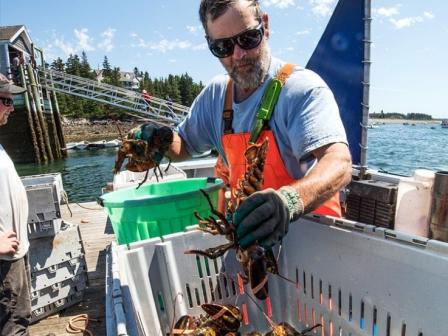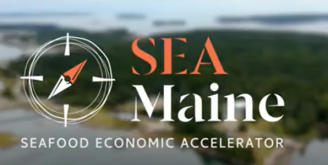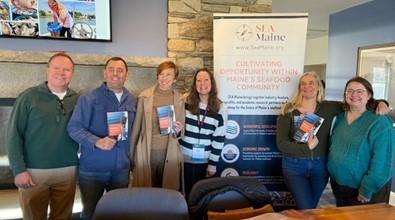
Archived Content
This site contains information that has been considered archived and will no longer be updated.
With EDA Support, Maine’s Marine Industry Reaches New Depths
FocusMaine was recently awarded a grant to establish a new Seafood Promotional Council, something Waterston says would not have been possible without EDA’s support.
The seafood industry is often described as the lifeblood of Maine, providing food to customers the world over. Generations of fishermen have sailed its waters in search of lobsters, crabs, scallops, and a variety of other fish. In recent years, the cultivation of oysters, mussels, seaweed, and other species has added to their hauls. Seafood, along with forestry, agriculture, and outdoor recreation, is one of the iconic natural resource-based industries that dominate the economy in the Pine Tree State.

With more than 3,400 miles of coastline available, Maine has the largest section of working waterfront in the United States. Today, more than 21,000 people are employed by the state’s seafood industry, nearly 13,000 in harvesting alone. While they are helping to sustain the world, these men and women are also working to sustain their local communities.
In October 2017, Maine was rocked by a severe storm and coastal flooding, which impacted 13 of the state’s 16 counties. It destroyed infrastructure, damaged logistics, and impacted the seafood supply chains. The White House issued a major disaster declaration, making federal funds and resources available.
A collaboration was formed between the Maine Technology Institute (MTI) and FocusMaine. Together, they applied for federal disaster relief from the U.S. Economic Development Administration (EDA). They were awarded $2 million in funding to develop a strategic roadmap to strengthen Maine’s marine living resources economy and increase resiliency against future natural disasters.
EDA’s funding, matched by MTI and FocusMaine, helped support creation of the Seafood Economic Accelerator in Maine (SEA Maine). This industry-led initiative has brought together leaders in Maine’s commercial fishing, aquaculture, and seafood economy. Together, they have developed a roadmap and action plan for economic growth, market and workforce development, and greater resiliency in Maine’s marine economy.
“Maine’s seafood industry is comprised of many small businesses,” said Leo Waterston, Program Director with FocusMaine. “We wanted to bring these disparate groups together and develop an economic roadmap for the future, one that would build on the industry’s heritage while leveraging science and technology to address today’s problems, including climate change.”

This roadmap outlines a set of strategic goals that were developed to find common ground and benefit the entire seafood sector. It identifies projects that are ready for immediate implementation - those unaffected by existing policies or challenging issues. It maintains respect for aquatic life, including whales and other mammals that have historically been impacted by the fishing industry, while adapting to address the needs of a changing climate.
“SEA Maine is focused on accelerating the overall value of the marine economy, by increasing infrastructure investments and supporting fisheries and aquaculture,” said Anne Schlitt, Senior Program Director. “The roadmap helps to do just that, and we’ve been very successful in building our coalition around that common agenda.”
The roadmap was first announced in March 2024 at the 49th Annual Maine Fishermen’s Forum. The three-day annual event in Rockport brings together fishermen, sea farmers, federal and state scientists and other stakeholders for education, collaboration, commerce, and more. It was the ideal setting to announce this new initiative, which will benefit those in attendance and the industry as a whole.
The collaboration hopes to build upon its success and leverage its work to provide an even greater impact on the seafood industry. FocusMaine was recently awarded a grant to establish a new Seafood Promotional Council, something Waterston says would not have been possible without EDA’s support.
“SEA Maine is charting the path for an innovative and prosperous marine economy,” said Sara Rademaker, Co-Chair of SEA Maine Steering Committee. “Investment in wild caught fisheries, aquaculture, fishermen, sea farmers and coastal communities will grow our marine economy in Maine, the U.S., and across the globe, creating new market opportunities.”
The roadmap and a series of related videos are all available online.
To read about other EDA success stories, please visit eda.gov.
